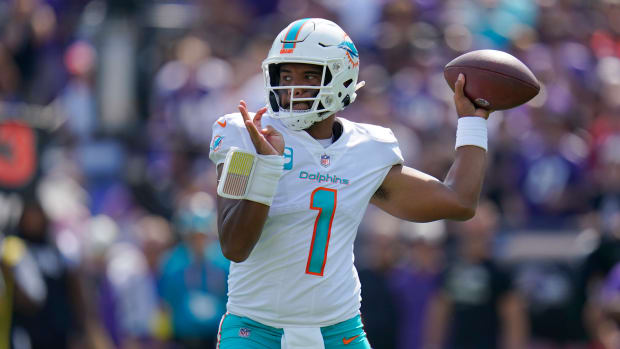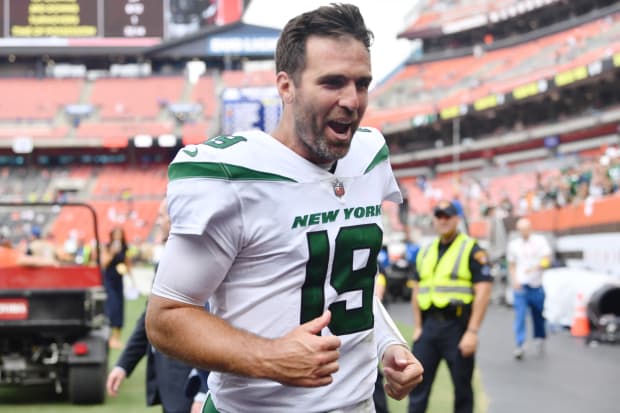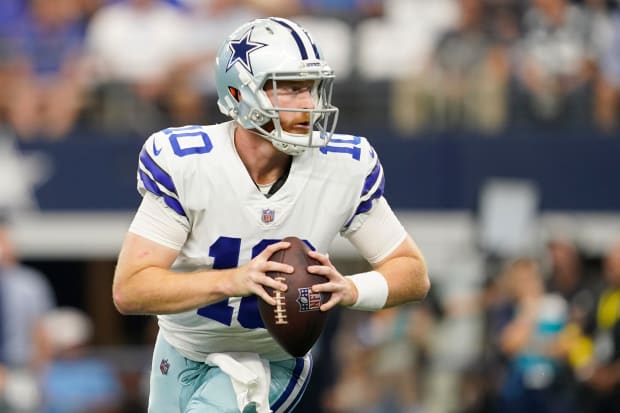Three star quarterbacks detail to MMQB how they got it done in enormously unlikely victories.
More MMQB: QBs, QBs, and More QBs Rule Week 2 | Breer’s 10 Takeaways from Sunday | The Best NFL Week 2 Performances
You don’t have to dig too deep to figure out that the first 30 minutes of Sunday’s game in Baltimore didn’t match Miami’s script.
The Dolphins were outgained by the Ravens, 288–166. They’d been tripled up in rushing yards and allowed for Baltimore supernova Lamar Jackson to post a perfect quarterback rating, while their own QB, Tua Tagovailoa, had thrown two picks. They were down 28–7, and the third quarter only further reinforced a result that seemed to be written in the stars, particularly when Jackson burst through the heart of the Miami defense for a 79-yard score.
But with the score 35–14 headed into the fourth, they were also accountable, and that, really, started with Tagovailoa and the picks that helped inflate a sizable deficit.
“Mike [McDaniel] always talks to us about how Adversity is opportunity,” Tagovailoa told me postgame. “And that's what those were. You can never get too high, you can never get too low, you just got to continue to play. And all of those happened in the first half, there was a whole ’nother game to be played in the second half.”
There sure was, and playing that second half like the Dolphins did may just have given the rest of us a window into where they see themselves going from here, with Miami’s 42–38 win now in the rearview mirror. McDaniel’s bunch is 2–0, with a visit from mighty Buffalo slated for Sunday.

Julio Cortez/Associated Press
But for now, that one can wait, because what went down at M&T Bank Field won’t soon be forgotten, by either team involved. And as much as it will be remembered for the late-game, big-play fireworks, Tagovailoa swears that the whole thing was set up by the Dolphins’ willingness to play small ball early in the second half, as they worked to get back from the massive deficit.
“If you look at the first half, we didn't play the way we said we wanted to come out and play,” Tagovailoa says. “We were taking shots that weren’t there, we were wishful playing, if you will. But coming into halftime, we kind of wanted to go back to what we said we wanted to do.”
That was evident first in the Dolphins’ 12-play, 75-yard touchdown drive to open the half—the longest play covered just 15 yards. It continued through their next two possessions, too, with the second being another 75-yard drive, this one of seven plays, with a long play of 33 yards, and ended with a two-yard touchdown throw to journeyman River Cracraft.
“And then when they did give us shots,” Tagovailoa says, “that’s when we took the shots.”
The first came with 7:54 left and Miami down 35–21. The Dolphins lined three receivers up to Tagovailoa’s left, with Hill all alone to his right, creating a one-on-one situation down that sideline. The rest was academic—Hill was locked on to Marcus Peters and roasted him for a 48-yard touchdown on a moon shot from Tagovailoa.
The second came minutes later, on a third-and-6 with 5:27 left, with Hill lined up across from rookie corner Jalyn Armour-Davis, who let Hill run right by him (there had to be some miscommunication on the play) for a 60-yard touchdown. That made it 35–35 and was maybe even more inexplicable in how it allowed Hill to shake free.
“He called really good plays for us,” Tagovailoa said slyly, when I asked how in the world Hill wasn’t accounted for on those plays. “He called plays to get guys open.”
McDaniel had a few more in his bag after that, too, to answer Justin Tucker’s subsequent, go-ahead 51-yard field goal, getting Hill the ball again for a 21-yard catch and run as part of the team’s game-winning, six-play, 68-yard touchdown drive.
And regardless of how all this happened, it certainly worked, and now McDaniel has a team that very much believes in its staff, and what they’re selling. Which, to me, was pretty clear when I saw the “Adversity is opportunity” line that Tagovailoa gave me again in the video of McDaniel’s address to the team in the locker room after the scintillating win.
“Hey, you guys keep proving me right,” McDaniel told the players. “This is a special crew. And if that doesn’t give you an example of what we mean by Adversity is opportunity, then how great does this feel? And it felt like s---, O.K.? And that’s the point, that we should never f--- around again with hanging our heads. It is what it is. It’s just a bigger celebration when you come through.”
Which explains why when I asked Tagovailoa if he sees this as a launching point for bigger things, he balked, just a little bit.
“Well yeah, like I said, we never want to be too high or too low,” he said. “We want to play our standard of football every time we go out there.”
Two weeks in, they’re giving us a pretty clear and exciting picture of what that is. And as for what this means for Tagovailoa himself?
“This was a big game for our team,” he said. “It wasn't just something that was big for me; it was big for all of us. We talked about being down and what that’s going to look like for us facing adversity. And for us to have overcome that adversity within the second half, that tells you about the resiliency of our team.”
He did concede, though, that “I can’t vividly remember being down by that much and then coming back and winning a game,” and put the Baltimore comeback up there with the one he led in the national title game as an Alabama true freshman in January 2019.
Which, in a roundabout way, confirms how much this one meant to him, and the Dolphins.
Flacco on an ‘Eerie Silence’ in Cleveland

Ken Blaze/USA Today Sports
When Nick Chubb made his way to the left pylon for a 12-yard touchdown Sunday, around 4 p.m. Eastern, I was sure enough that the Browns’ 30–17 lead would hold up that I tweeted—idiotically—this.
In my defense, there was just 1:55 left, and the Jets were out of timeouts. But at least one guy wearing green was happy to see Chubb cross the goal line.
“For sure,” quarterback Joe Flacco said over the phone afterward. “The thought that goes through your head is like, He wasn’t supposed to do that, so, all right, here we go, let’s see what we can do. You know?”
Flacco is in his 15th NFL season. He’s seen miracles.
And this one, staged by the Jets in Cleveland, is among the wildest he’s been a part of. Which may be best described by the circumstances above—New York was down 13, inside the two-minute warning, with no timeouts left—and that the Jets would actually wind up making Chubb pay for getting into the end zone after picking up the first down on that fateful first-and-10 from the 12. Had Chubb done that, Cleveland takes three knees, and the game is over. Instead, the Jets won the ball game 31–30.
“Listen, any game that ends like that is just, the most ridiculous emotions you can think of,” Flacco says. “So I think when you think of this game, it’s obviously only Week 2 so maybe it doesn’t quite go to No. 1 in terms of crazy games that I played in, but it’s definitely up there.”
The spark came almost right away, after Chubb’s score. After Flacco started the Jets’ possession to follow with a 9-yard hookup with Tyler Conklin, on second-and-1, Corey Davis snuck free down the right sideline, as open as you’ll ever see an NFL receiver. Flacco launched a bomb out there under duress, and 66 yards later the deficit was cut from 13 to 6.
“I think they had a miscue,” Flacco says. “Their corner stayed low, their safety didn’t get any width—he actually kind of went back to the middle of the field a little bit and got on the hash. So Corey was able to get on top of the corner, and then he didn’t have any help. It’s one of those routes that I knew was going to take a little bit of time to develop, so I try to just find the soft spot in the pocket, and when I let it go, I knew he was open, but when the ball got closer to getting there, it was like crazy how open he was.
“I was like Oh, my God, he’s going to walk in the endzone. I have never heard a stadium that eerie before; it was a weird, really, really weird silence. I wasn’t sure if there was a flag or what was going on.”
And then, based on the onside kick the Jets had tried last week against the Ravens, Flacco had an idea that the Jets’ special teams might have something in the bag.
“It just seemed to look like Amari [Cooper]—he was the guy over there—thought the ball was going to go out of bounds,” Flacco says. “And I think Will Parks is the guy that did a great job just keeping it in. Next thing you know, it was our ball. So now it’s like, All right, here we go. This is our chance; it’s up to us at this point.”
From there, Flacco methodically got the Jets from their own 47 into the red zone and, with 25 seconds left, faced a third-and-10 from the Browns’ 15 with the game on the line.
That’s when Jets OC Mike LaFleur sent in a call that Flacco says “put a smile on my face.”
Earlier in the game, LaFleur had called what’s referred to as “Z Hammer.” The play is designed to use the tight end to pull the linebacker, in zone coverage, away from the Z receiver—only as the Jets ran it, they couldn’t quite get the linebacker to stick to tight end Conklin.
So on this occasion, LaFleur switched it up and went with “Z Strike,” which was the same play but with the Z coming over the middle of the field.
“They were kind of playing soft, they were playing two-shell, we tried to grab the linebacker on that side of the field with just a short, little underneath route.”
Sure enough, linebacker Jeremiah Owusu-Koramoah, at the snap, moved very slightly toward Conklin, and rookie Garrett Wilson raced past him—catching the ball at about the 2 with Owusu-Koramoah flailing to keep up. Wilson waltzed into the end zone for the game-winner.
The win puts the Jets at 1–1, with the 0–2 reigning AFC champion Bengals coming to town next Sunday. And it also shows the team has head coach Robert Saleh’s back, after Saleh told the media last week that he was keeping “receipts” on those who have doubted the team and its progress the last couple of years.
“I think it just kind of was a message to us as to how much he believes in us,” Flaccos says. “It does kind of give you a sense as a player to want to go out there and back him up. … I think he does a hell of a job, so when somebody like that comes out and says something like that, it really feels like they have your back. When you have a relationship like he does with this team, it makes us want to go out there and back that up for him.”
A couple of hours later, Saleh joked via text that he’s “gotta win a heck of a lot more than 1 game to cash those in.”
But at least for now, and even with a backup quarterback playing the hero, he knows he’s got one that’s really worth something.
Watch NFL games with fuboTV: Start a free trial today!
A Rush Revelation in Dallas

Tony Gutierrez/Associated Press
Cooper Rush knows it’s not normal for a backup quarterback to have six seasons of experience in one place—the word “journeyman” was created for a certain type of a player, and the typical experiences of such a player. The 28-year-old Cowboy also knows well enough to understand the kind of advantage it’s created for him.
“You have a lot of continuity in the building, been around a while, been with [offensive coordinator] Kellen Moore for a while, a lot of guys,” he told me late Sunday. “So you have a rapport with them, you’ve been in the huddle with these guys, they’ve seen you play over the years, and you kind of take advantage of that, for sure. You know the offense well and know what these guys can do. I know that continuity is a key asset.”
And in a bind, it really mattered for a Cowboys team that needed a win in the worst way.
Dak Prescott went down in Dallas’s season opener with a thumb injury on his throwing hand and underwent surgery last week, which left the Cowboys in a weird spot. Go looking for a bigger name backup like they’d done in the past when Tony Romo got hurt? Or stand pat with Rush?
With the idea Prescott could be back within a month, it was always going to be the most logical thing just to ride it out with Rush in the short term. And yet, listening to the way Dallas’s people talked about Rush last week, you’d think there might be a little bit more there than most might believe, based on the limited exposure most have had to him. That idea got wings in two ways Sunday.
First, Rush came out and helped the Cowboys build a first-half lead—the Central Michigan product was 12-of-18 for 162 yards and a touchdown to give Dallas a 17–3 edge at the break. Which was great, until the Bengals backed off a little to try to force the Cowboys to go on longer drives.
“Yeah, we got those explosive plays early on, [Tony Pollard’s] long run, Noah [Brown’s] long catch,” Rush says. “It’s hard to drive the ball 12, 13 plays every time, you got to get those explosives. And then in the second half, we just weren’t hitting them.”
As such, Dallas’s first four possessions of the second half ended with three punts and a fumble, which opened the door for Joe Burrow to lead the Bengals back and tie the game with less than four minutes left.
Which brings us to the second piece of Sunday’s Rush revelations: when he found a way to get Dallas into position to kick the game-winning field goal.
The Cowboys set up shop for their last possession at their own 35 with 57 seconds left. Rush’s first throw was out to the left flat to CeeDee Lamb for eight yards. Then he went over the middle to Brown for 12, then back to Lamb for another 10, and suddenly Dallas was at the 35, having called its final timeout with just 24 seconds left. And at that point, kicker Brett Maher communicated to the coaches he would rather have the ball at the right hashmark than a little bit closer. So …
“We knew we were going to run it over to the left, and you have to get on the ball and clock it,” Rush says. “We had plenty of time, it wasn’t a super hurry-up situation, you want to run it, get to the left hash and then clock it with four seconds left. It got stretched out, and our guys did a great job of getting back to the ball. We repped that a lot, and it worked out.”
Which set Maher up for his 50-yard game-winner, and made the blown lead nothing more than a memory on an afternoon during which Rush might’ve outplayed Joe Burrow.
For Rush himself, though, this was as much about keeping the train on the tracks as anything, with his experience giving him a solid foundation to work off over a week like this one.
“No one wants to go 0–2,” Rush says. “The NFL is hard and to get that first win is big, and today was truly a team effort we had. Turp [KaVontae Turpin] set us up for three points before the half, with the punt return. The defense, all day long, keeping them out of the end zone, and we were able to start fast and just make enough plays at the end. We can really grow; I’m personally going to grow a lot.”
Sunday showed that he really already has.
More NFL Coverage: